
"You not only provide funding for young directors but also promote their works around the world. I can't think of anything cooler than that." This sentiment was expressed by Japanese director Rina Naganuma to members of the Maritime Guangdong Program committee after the first event of the 2024 Maritime Guangdong Program Screening Season held in Sapporo, Hokkaido. She mentioned that if given the opportunity, she would love to visit Guangdong, the birthplace of the Maritime Guangdong Program, and even create a new short film there.
The mid-October event in Sapporo not only allowed Japanese audiences to experience the unique charm of China's Lingnan region through film but also garnered significant attention from local filmmakers. After the screening, the Maritime Guangdong Program committee engaged in in-depth discussions with the Sapporo Film Commission , the Sapporo International Short Film Festival committee, and other parties. They exchanged views and experiences on how films can promote local cultural and tourism consumption and foster cross-cultural communication, addressing shared concerns among filmmakers from both countries.
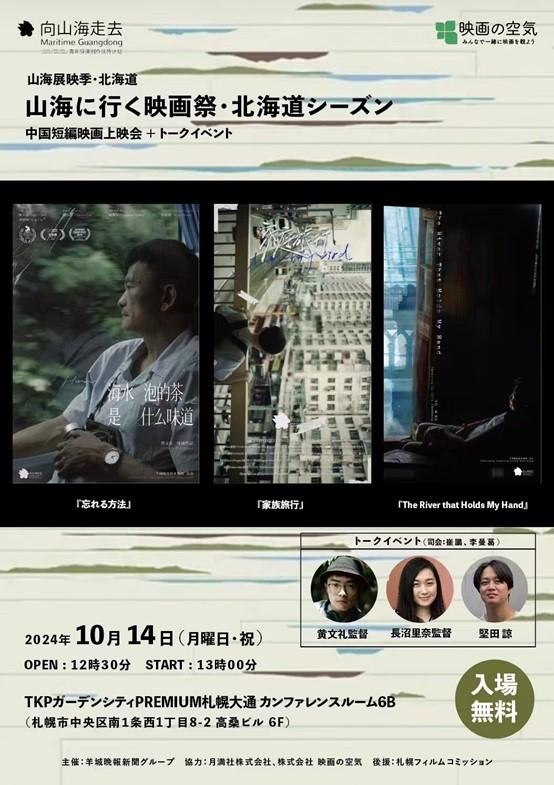
Sapporo Film Commission: Looking forward to strengthening cultural cooperation between Guangdong and Hokkaido
The Maritime Guangdong Program Screening Season has showcased three youth short films supported by the Maritime Guangdong Program to Japanese audiences: "Migratory Bird ", "How Can I Rid My Mind of Her ", and "The River That Holds My Hand". As a supporting organization, the Sapporo Film Commission provided significant assistance in audience recruitment and event promotion. Its representative, Yuka Haga , attended the screenings and post-viewing discussions, engaging closely with the audience and the young directors from the Maritime Guangdong Program. Haga expressed admiration for the depiction of Lingnan culture in the Maritime Guangdong Program short films and looks forward to more Chinese directors coming to Japan for cultural exchanges in the future.
The Sapporo Film Commission, part of the Japan Film Commission , is the largest film commission in the Hokkaido region. It serves as a bridge between the government and filmmakers. On the one hand, it advocates for financial support, location assistance, and permits for film crews coming to Sapporo, and on the other hand, it promotes local tourism by supporting film production.
Hokkaido is a renowned international tourist destination in Japan. As the administrative and industrial center of Hokkaido, Sapporo boasts the unique beauty of its snowy landscapes, combined with the vibrant atmosphere of a metropolitan city. This blend is a significant draw for film crews looking to shoot on location. A recent hit is the Netflix series "First Love (2022)", directed by Yuri Kanchiku , starring Hikari Mitsushima and Takeru Satoh , which was filmed entirely in Sapporo. The romantic snowy scenery of the area perfectly complements the series' pure love theme.
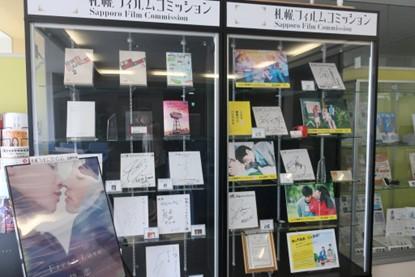
To better assist out-of-town film crews coming to Sapporo for filmmaking, the Sapporo Film Commission has created a comprehensive "Filmmaking Guide". This booklet details various local historical, cultural, and natural filming locations, along with the seasons when these sites are best showcased on camera. It also thoughtfully includes average temperatures for each month of the year, as well as sunrise and sunset times, to help crews plan their schedules.
After a film or television work is released, the Sapporo Film Commission produces a "Filming Map" for that project, which is displayed in various public areas around the city, allowing tourists to "travel through the film." Yuka Haga explains, "While we haven't tracked the exact number of tourists drawn to Sapporo by films shot here, visitor surveys collected at major attractions indicate that quite a few people come specifically because of the films or series shot in this area."
In recent years, Yuka Haga and her colleagues have frequently attended the annual Hong Kong International Film Festival . "For overseas creators, we can't just wait for them to come to Sapporo. We need to promote our city at international film festivals," Haga added. In addition to showcasing Sapporo's beautiful scenery, local incentive policies are also a major focus of their promotion. "If a film shoots in Sapporo for more than seven days, the Sapporo Film Commission will provide a subsidy of up to 10 million yen."
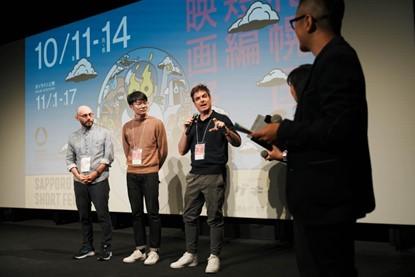
Yuka Haga introduced that in the past, the Sapporo Film Commission had limited contact with filmmakers from the Chinese mainland . She hopes that the Maritime Guangdong Screening Season will serve as a starting point for strengthening communication and deepening understanding between the two sides, paving the way for creators from the Chinese mainland to come to Sapporo for filming in the future.
The Maritime Guangdong Program committee also introduced Yuka Haga and her colleagues to Guangdong's rich historical, cultural, and natural landscapes, highlighting its advantages as a location for film creation and shooting. Both parties agreed that Hokkaido's snowy landscape and Guangdong's climate and scenery are distinctly different, creating a strong attraction for both creators and audiences. By enhancing collaboration, they hope to generate more vibrant creative sparks.
Sapporo International Short Film Festival: Aiming for more interaction and exchange among young filmmakers from Japan and China
The Sapporo station event of the Maritime Guangdong Screening Season coincided with the 19th Sapporo International Short Film Festival. The screening of the Maritime Guangdong Program short films attracted international participants and film enthusiasts attending the festival. After the screenings, Kohei Kuramoto , the operation manager and producer of the Sapporo International Short Film Festival, engaged in discussions with members of the Maritime Guangdong Program committee.
The Sapporo International Short Film Festival & Market is one of the largest, most authoritative, and influential short film festivals in Japan and Asia. It has received multiple certifications, including the Canadian Screen Award Qualifying status, making it a central platform for showcasing multinational films in Asia. Each year, the festival attracts between 2,800 and 3,500 works of various types. Notably, the short film "How Can I Rid My Mind of Her " directed by Huang Wenli from the Maritime Guangdong Program, was nominated for the international competition section of this year's festival, making him one of only two Chinese directors and films to receive such recognition.

"Just like many creators start from the Maritime Guangdong Program and eventually shine on the international stage, what makes us most proud of the Sapporo International Short Film Festival is watching many new directors take their first steps here," says Kohei Kuramoto. He cited the example of a low-budget hit film in Japan, " One Cut of the Dead Mission: Remote ", directed by Shin'ichirô Ueda, who was a frequent attendee at the Sapporo International Short Film Festival during his debut.
Like most film festivals, the Sapporo International Short Film Festival has faced challenges in the past, including funding shortages and partners dropping out. "Compared to earlier years, the current scale of the Sapporo International Short Film Festival has diminished quite a bit, but we have a stronger feeling that everyone is working together for the sake of art," Kuramoto explains. "Many international festivals require the 'uniqueness' of submissions, meaning if a film is accepted here, it cannot be shown at other festivals. However, we don't have such a requirement. The story itself being interesting is our highest standard for selection."
Through the festival, Kuramoto and his partners aim to identify and promote outstanding local directors to the international stage. However, due to limited funding, he feels that this goal hasn't been fully realized. Therefore, he greatly appreciates the efforts of the Maritime Guangdong Program in this regard. "Whether it's financial support or international promotion, you've excelled in both areas."
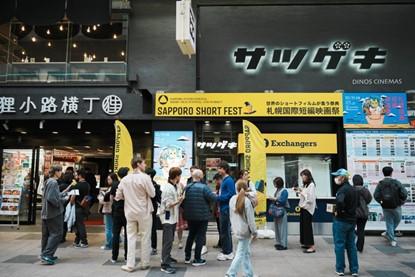
Kohei Kuramoto believed that short film creation is an indispensable part of young directors' growth. "Completing an expression quickly at a lower cost than a feature film is a great way to 'practice' and allows the outside world to get to know them more quickly." Additionally, the shorter format is very popular with younger audiences. "For instance, in Japan, there are video platforms specifically for short film screenings, where young people can watch all the short films on the platform for the price of a cup of coffee each month."
In recent years, the Guangdong-Hong Kong-Macao Greater Bay Area has developed its film industry by leveraging its industrial cluster advantages, a model that Kuramoto finds very effective. "Japan also faces the issue of uneven distribution of resources in the film industry. Our response is similar: regions with similar cultures should collaborate to create cultural products with their unique styles, rather than insisting that each region develop a complete industrial chain on its own." Kuramoto cited recent collaboration on film projects between Mikasa, Hokkaido , and Akita City in the northeast region of Honshu .
"The meeting between the Maritime Guangdong Program and the Sapporo International Short Film Festival is a rare opportunity," Kuramoto stated. "In the future, we hope to bring outstanding works by young Japanese directors to China through the Maritime Guangdong Program, and we also welcome more works from young Chinese directors to be screened in Japan."
[Overseas Echo]

Ryo Kata , a film scholar and critic from Hokkaido University: "The screening of the Maritime Guangdong Program in Japan is necessary. Through this event, Japanese audiences can gain a better understanding of Chinese films, and thereby a deeper insight into the lives of Chinese people. In this process, Chinese and Japanese people are connected through film."
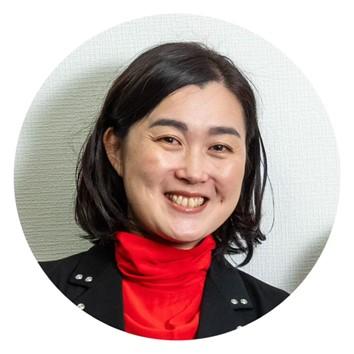
Rina Naganuma , a young Japanese director: "I have lived in Sapporo since I was a child, and I really want to visit Guangdong, China. I want to shoot films in Guangdong because cinema is my way of understanding a place. I think it would be very interesting to view Guangdong through a Japanese perspective."

Kohei Kuramoto, operations manager and producer of the Sapporo International Short Film Festival: "You (Maritime Guangdong Program) have done an excellent job in both financial support and overseas promotion."

Yuka Haga , a representative of the Sapporo Film Commission: "In the past, the Sapporo Film Commission had limited connections with filmmakers from the Chinese mainland. I hope that this Maritime Guangdong Screening Season event will serve as a starting point for strengthening communication and deepening understanding between both sides."
Source :Lingnan on the Cloud
让北海道“看见”广东,电影架起跨文化交流桥梁
“你们不但给青年导演扶持金,还把他们的作品推广到世界各地,我想不到比这更酷的事了。”在此前于日本北海道札幌举行的2024年山海展映季首站活动结束后,日本导演长沼里奈对山海计划组委会成员表示,如果有机会,她想到山海计划的诞生地中国广东看一看,甚至在这里创作一部全新短片。
10月中旬山海展映季的札幌站活动,不但让日本观众通过电影直观感受到中国岭南的独特风情,也引起当地电影人的高度关注。展映结束后,山海计划组委会与札幌电影委员会、札幌国际短片电影节组委会等各方进行深入交流,沟通中日电影创作者的共同关切,并就电影如何促进地方文旅消费和跨文化交流,交换看法与经验。
札幌电影委员会:期待广东与北海道加强文化合作
本次山海展映季活动为日本观众放映了由山海计划扶持拍摄的三部青年电影短片:《家庭旅行》《海水泡的茶是什么味道》《The River That Holds My Hand》。作为活动的支持单位,札幌电影委员会为前期观众招募和活动宣传提供了大力协助,其代表芳贺优菜出席了观影和映后交流,与山海计划青年导演和观众亲密互动。芳贺优菜对山海计划短片中展示的中国岭南风情表示赞叹,并期待未来有更多中国导演来日本交流。
札幌电影委员会(Sapporo Film Commission)是日本电影委员会旗下机构,也是北海道地区规模最大的电影委员会,其职责是作为政府与电影创作者之间的沟通桥梁:一方面为前来札幌拍电影的剧组争取财政支持、场地支援和许可申请,另一方面也通过扶持电影创作来助力当地的旅游观光业。
北海道是日本著名的国际旅游胜地。作为北海道的行政中心和产业中心,札幌既拥有北国雪原的独特风光,也具备大都市的繁华烟火气。两者相结合,成为吸引剧组来当地取景的重要因素。近年大热的由寒竹百合执导,满岛光、佐藤健领衔主演的Netflix剧集《初恋First Love》(2022),便全程在札幌拍摄,当地的浪漫的雪景与影片的纯爱主题十分契合。
为了更好地帮助外地剧组来札幌拍戏,札幌电影委员会专门制作了一本“拍摄指南”。小册子详细列出当地的各类历史、人文、自然取景地,以及这些取景地更适合在什么季节被镜头呈现。每年各个月份的平均温度,甚至日出和日落时间也被细心标出,以方便剧组安排拍摄行程。
待影视作品公映或播出后,札幌电影委员会还会制作该作品的“拍摄地图”,放在市区的各类公共展示区域,供游客“跟着电影去旅行”。芳贺优菜介绍:“虽然没统计过在札幌取景的作品到底带来多少观光客,但在各大景点回收的游客调查问卷中,我们发现确实有不少人是冲着在这里拍摄的电影或剧集而来。”
近年来,芳贺优菜常常和同事们一起,参加每年一度的香港国际电影节。“对海外的创作者,我们不能在札幌坐等他们的到来,还是要到海外电影节多宣传。”芳贺优菜说,除了札幌的美景,当地的优惠政策也是他们宣传的重点:“电影只要在札幌有7天以上的拍摄行程,札幌电影委员会就能给予最高1000万日元的补助金。”
芳贺优菜介绍,在过去,札幌电影委员会与中国内地的电影创作者联系并不多。她希望从这次的山海展映季活动开始,双方能加强沟通,加深了解,未来能有来自中国内地的创作者到札幌拍片。
山海计划组委会也向芳贺优菜和她的同事们介绍了广东丰富的历史人文自然景观,以及作为电影创作地和取景地的优势。双方一致认为,北原雪地北海道和地处中国南方的广东在气候和景观上迥然不同,因此无论从创作角度还是观众角度,彼此之间都有着强烈的吸引力。双方若加强合作,有望碰撞出更绚烂的火花。
札幌国际短片电影节:希望中日青年短片多互动交流
山海展映季的札幌站活动,适逢第19届札幌国际短片电影节举行。山海计划短片的放映,也吸引了来自该电影节的国际参赛者和影迷参加。展映结束后,札幌国际短片电影节运营负责人、制片人仓本浩平和山海计划组委会成员进行了交流。
札幌国际短片电影节( Sapporo International Short Film Festival & Market ) 是日本和亚洲最大、最具权威和影响力的短片电影节之一,受到加拿大影视奖(Canadian Screen Award Qualifying)等多项认证,是亚洲跨国电影展示的中心舞台,每年吸引2800至3500个不同类型的作品参展。由山海计划青年导演黄文礼执导的短片《海水泡的茶是什么味道》(2023)入围本届电影节国际竞赛单元,是其中唯二入围的中国导演及中国影片。
第19届札幌国际短片电影节于10月11日至14日举行
“就像很多创作者从山海计划起步,最终在国际舞台崭露头角一样,我们做札幌国际短片电影节最自豪的一点,也是看着很多新导演从这里出发。”仓本浩平举例,日本曾经出现过一部票房“以小博大”的小成本黑马电影《摄影机不要停!》,其导演上田慎一郎,刚出道时便是札幌国际短片电影节的常客。
和大多数电影节展一样,札幌国际短片电影节在过去也经历了活动资金短缺、合作伙伴离开等种种困难。“比起从前,现在的札幌国际短片电影节规模小了不少,但所有人齐心协力为艺术努力的感觉却更强烈了。”仓本浩平介绍,“很多国际电影节会要求作品的‘唯一性’,来了这个电影节就不能去别的电影节,但是我们不会这么要求,故事本身足够有趣是我们选片的最高标准。”
通过电影节,选出优秀的本土导演苗子,然后把他们推广到国际舞台去,这是仓本浩平和他的伙伴们的最大目标。但由于资金所限,这项工作完成得并不那么令他满意。因此,他格外赞赏山海计划在这方面所作的努力,“无论是资金扶持还是海外推广,这两点你们都做得太到位了。”
仓本浩平认为,短片创作是青年导演成长路上不可或缺的一环,“用低于长片的成本迅速完成一次表达,这既能‘练手’,也是让外界尽快认识他们的最好方式”。同时,短片的体量也很受年轻受众的欢迎,“譬如日本有视频平台专门做短片放映,年轻人每个月只要花一杯咖啡的价格就能看到平台上的所有短片。”
这些年,中国的粤港澳大湾区以产业集群优势发展电影产业,这一模式在仓本浩平看来十分正确。“日本也面临电影产业资源分布不均衡的问题。我们的应对方法同样是抱团合作——有着相近文化的地区联手,打造有自己独特风格的文化产品,而不是一味要求每个地区都打造一套完整的产业链。”仓本浩平举例,北海道的三笠市和本州东北地区的秋田市,最近便进行了电影项目的合作。
“山海计划和札幌国际短片电影节的相遇,是一次难得的缘分。”仓本浩平表示,“未来我们很希望通过山海计划,把日本青年导演的优秀创作送到中国,也欢迎中国青年导演的作品多到日本来放映。”
【海外回音】
“山海计划这次来日本的放映交流很有必要。通过这次活动,日本观众更了解中国电影,从而更了解中国人的生活状态。在这个过程中,中国人和日本人通过电影连接到了一起。”——北海道大学电影学者、电影评论家坚田谅
“我从小生活在札幌,我很想去中国的广东看看。我想在广东拍片,因为电影是我了解一个地方的方式。我觉得,通过日本人的视角看广东,这会是一件很有趣的事。”——日本青年导演长沼里奈
“无论是资金扶持还是海外推广,这两点你们(山海计划)都做得太到位了。”——札幌国际短片电影节运营负责人、制片人仓本浩平
“在过去,札幌电影委员会与中国内地的电影创作者联系并不多。希望从这次的山海展映季活动开始,双方能加强沟通,加深了解。”——札幌电影委员会代表芳贺优菜
文 | 记者 李丽
翻译 | 王凯欣
英文审校 | 王枥焓
-
Poster丨Zengcheng, Guangzhou: The silk floss trees are in full bloom, bringing pink romance to autumn
2024-10-23 21:33:58 -
Poster丨Guangzhou Haizhu held a multi-ethnic-themed art performance
2024-10-22 21:51:32 -
HarmonyOS NEXT officially debuted tonight
2024-10-22 22:23:40 -
Guangdong's foreign trade increased by 11.1% in Q1-Q3 of 2024
2024-10-22 22:24:23






